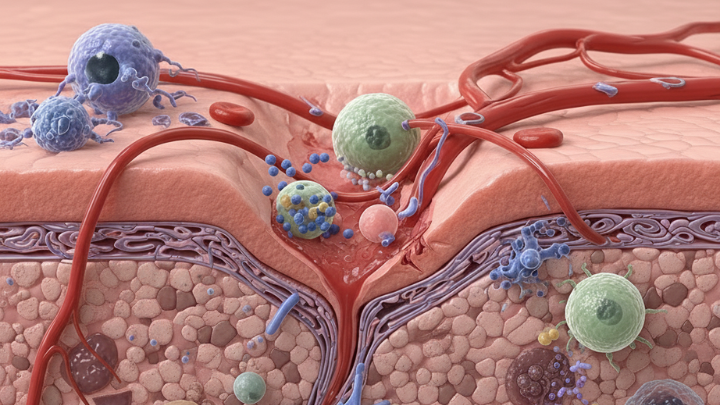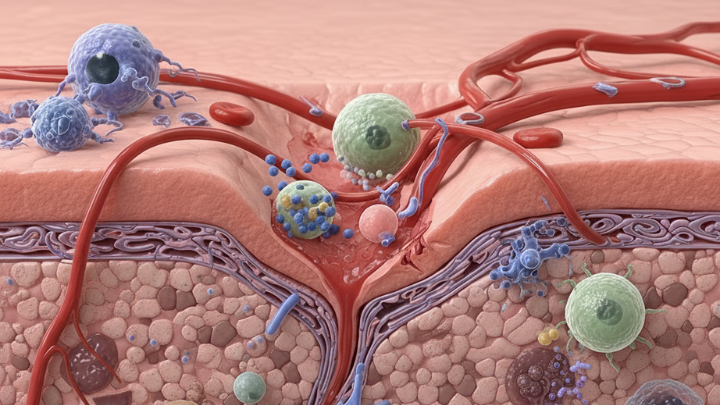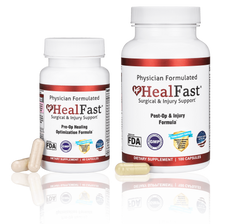

How Inflammation Impacts Scar Maturation?

When you think about scars, the first thing that comes to mind might be how they look - raised, red, or eventually faded. But the way scars form is actually a fascinating process driven by your body’s natural defense system. One of the key players in this journey is inflammation.
Inflammation isn’t always bad; it’s a critical step in wound healing. But when it lingers too long or becomes excessive, it can directly affect how scars mature, often making them more visible or uncomfortable. In this blog, we’ll explore the link between inflammation and scar tissue, why it matters, and what you can do to support healthy healing.

What is the Link Between Inflammation and Scar Tissue?
When your body is injured, whether from surgery, an accident, or even a minor cut, it immediately launches a defense mechanism to protect and repair itself. One of the first steps in this process is inflammation, a natural response designed to prevent infection and clear out damaged cells.
This early stage of healing is critical, but it also sets the tone for how well scars form later. While inflammation itself doesn’t directly create scar tissue, it provides the foundation on which the body builds new tissue.
Here’s what inflammation does during wound repair:
-
Fights off bacteria and reduces infection risk
-
Clears away dead or damaged cells
-
Sends signals to start the repair process
Once inflammation has completed its role, the body enters the proliferation phase, where collagen begins to form. Later, during scar maturation, this tissue is remodelled into a smoother and stronger structure.
However, when inflammation becomes too intense or lasts longer than necessary, it can disrupt this balance. The result? Scar tissue inflammation which often leads to thick, raised, or stiff scars.
So, does inflammation cause scar tissue? The answer is both yes and no. Inflammation itself doesn’t create scar tissue, but it sets the stage for how wounds repair.
Phases of Inflammation in Wound Healing
To understand why inflammation is both helpful and harmful, let’s break down the inflammation phases in wound healing:
1. Hemostasis Phase (Stopping the Bleed)
This happens within minutes after injury. Blood vessels constrict, and clotting begins to stop bleeding. Inflammatory signals are released to recruit immune cells.
2. Defense & Cleaning Phase
This stage usually lasts a few days. White blood cells rush to the site, cleaning debris and preventing infection. This is the phase where you’ll often notice redness, swelling, heat, and pain.
3. Proliferation Phase (Tissue Building)
Fibroblasts start producing collagen, new blood vessels form, and granulation tissue fills the wound. Inflammation should be tapering down by now.
4. Maturation/Remodeling Phase (Scar Formation)
As collagen reorganizes, the scar becomes stronger, and discoloration fades over months or even years. If inflammation persists into this stage, the scar may remain raised, stiff, or discoloured.
Is Inflammation Good for Healing Scars?
Inflammation often sounds negative, but when it comes to scar formation, it actually plays a vital role in the early stages of healing. Right after an injury or surgery, your body sends immune cells to the wound site. These cells fight off bacteria, clear out damaged tissue, and release signals that trigger the production of collagen, the building block of new skin and scar tissue.
In this way, controlled inflammation is good and necessary. It acts like your body’s alarm system, making sure repair begins quickly and effectively.
However, problems arise when inflammation becomes too strong or lasts too long. Prolonged inflammation can over-stimulate collagen production, leading to thick, raised scars such as hypertrophic scars or keloids. It can also cause ongoing redness, pain, and slow the overall recovery process.
Key takeaway: Inflammation is good for scar healing in the short term, but harmful if it lingers or becomes excessive. Managing inflammation properly, through good wound care, balanced nutrition, and sometimes medical treatments, can help your scars heal in a healthier, smoother way.
Keep Learning:
How to Treat Itchy or Painful Scars After Pregnancy-Related Surgery?
How do Silicone Gel and Sheets help Flatten Hypertrophic Scars?
How Bromelain Helps Reduce Swelling and Soreness After Liposuction or Tummy Tuck?
How to Heal Cellular Inflammation for Better Recovery?
Cellular inflammation is the body’s natural response to stress, injury, or surgery. In small amounts, it helps fight infection and repair tissue. But when inflammation persists at the cellular level, it can delay recovery, weaken immunity, and even worsen scarring. The good news is that you can support your body in calming excessive inflammation and creating the right environment for healing.
1. Nourish with Anti-Inflammatory Foods
What you eat directly impacts how your body manages inflammation. Foods rich in antioxidants and omega-3 fatty acids help neutralize free radicals and calm the immune response.
-
Eat more: fatty fish (salmon, tuna), walnuts, flaxseeds, leafy greens, berries, and turmeric.
-
Limit: processed foods, refined sugars, and trans fats, which trigger inflammatory pathways.
2. Use Targeted Nutritional Supplements
Nutritional supplements can provide concentrated support where diet alone may not be enough. Key nutrients such as Vitamin C and Zinc help boost collagen production and accelerate tissue repair, while Glutamine fuels immune cells and supports muscle healing.
Bromelain, a natural enzyme found in pineapple, can help reduce swelling and post-surgical inflammation (1). In addition, Probiotics play a crucial role in balancing gut health, which in turn influences systemic inflammation and overall recovery.
And the best part? All of these nutrients are included in HealFast’s post-surgery recovery supplements, formulated and backed by doctors. They are designed to support faster healing, reduce inflammation, and strengthen your body during recovery.
3. Stay Hydrated
Water helps flush out toxins and keeps cells functioning optimally. Dehydration can worsen inflammation and slow wound healing. Aim for at least 8–10 glasses of water daily, or more if you’ve recently had surgery.
4. Prioritize Rest and Sleep
During sleep, your body releases growth hormones and anti-inflammatory molecules that accelerate repair. Poor or inadequate sleep, on the other hand, heightens cellular stress and prolongs inflammation.
5. Manage Stress Levels
Chronic stress raises cortisol, which can fuel inflammation at the cellular level (2). Practices like deep breathing, meditation, or light yoga can help regulate stress hormones and promote recovery.
6. Gentle Movement and Circulation
Light activity, as approved by your doctor, helps improve blood flow, bringing oxygen and nutrients to healing tissues while reducing fluid buildup that can cause inflammation.
To further improve your results, HealFast also offers silicone-based scar gels, sheets, and tapes, which help minimize the appearance of scars and promote smoother scar healing.

- One of the most followed doctors online with 3.5+ million followers and 1 billion+ views in 2024 (Instagram, YouTube, TikTok, and Facebook)
- Board Certified Anesthesiologist and Clinical Assistant Professor who frequently teaches medical students, residents, and other physicians in medical school and hospital settings.
- Speaker and medical researcher having published 1 book, 3 book chapters, and over 57 scientific articles. Made over 100 presentations at national and international medical conferences on topics ranging from healthcare innovation, to nutrition, to patient safety.
- Serial entrepreneur having launched several healthcare companies with a track record of innovation within healthcare systems

Myro Figura, M.D.
- One of the most followed doctors online with 3.5+ million followers and 1 billion+ views in 2024 (Instagram, YouTube, TikTok, and Facebook)
- Board Certified Anesthesiologist and Clinical Assistant Professor who frequently teaches medical students, residents, and other physicians in medical school and hospital settings.
- Speaker and medical researcher having published 1 book, 3 book chapters, and over 57 scientific articles. Made over 100 presentations at national and international medical conferences on topics ranging from healthcare innovation, to nutrition, to patient safety.
- Serial entrepreneur having launched several healthcare companies with a track record of innovation within healthcare systems
HealFast Complete Surgery & Injury Formula (PreOp + PostOp)
OPTIMIZE RECOVERY & SUPPORT HEALING from surgery, injury, and extreme sports with the most comprehensive...
$99.95
Shop NowHealFast Complete Recovery + Sleep Bundle
SKU created for Complete and Sleep bundle.
$99.95
Shop Now












